Top 5 Essential Oils for Radiant Skin
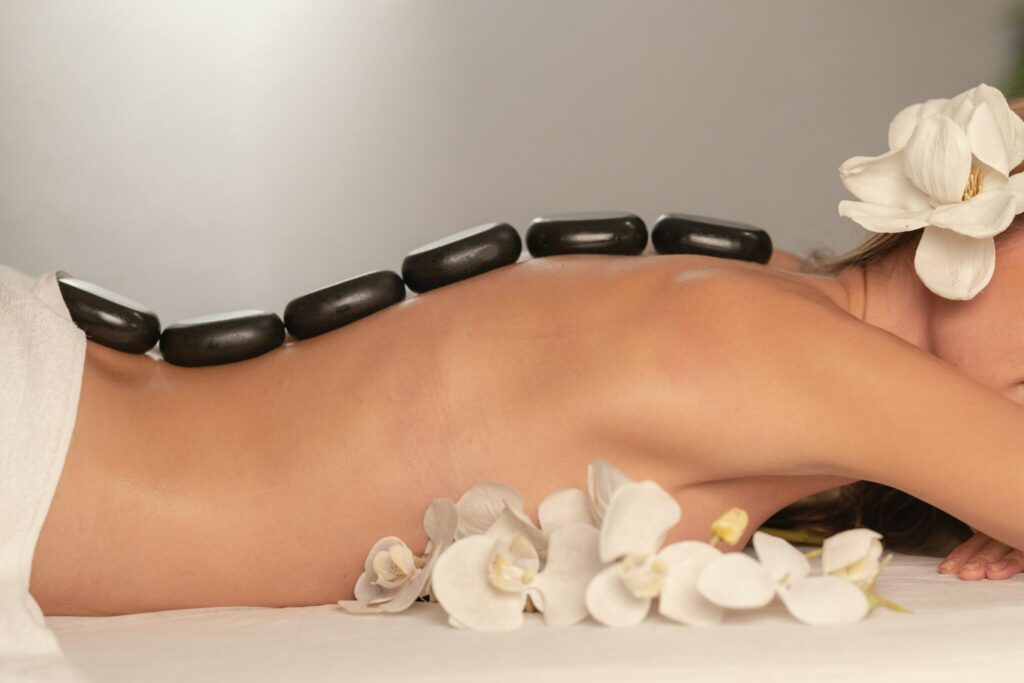
Essential oils have been used for centuries in skincare. They are believed to have healing properties that can help to improve the appearance of the skin. Essential oils can be used in a variety of ways, including in moisturizers, toners, and serums. Some of the most popular essential oils for skin care include lavender, rosemary, and chamomile.
In this article, we will focus on the top five essential oils, with a special emphasis on lavender oil.
What is Lavender Essential Oil?
Lavender oil is one of the most popular essential oils and has a wide range of benefits. It is known for its soothing and calming properties and can be used to help relieve stress, anxiety, and tension. Lavender oil is also effective in treating sensitive skin that may appear with acne, eczema, and psoriasis. In addition, lavender oil can be used to help promote restful sleep and to relieve pain.
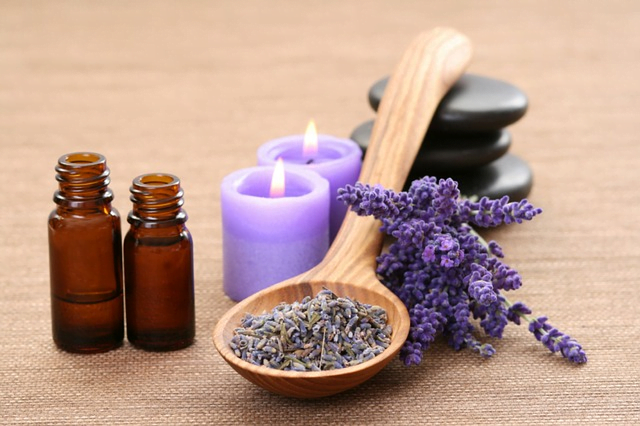
Lavender Oil: An In-Depth Look
Obtained by distillation from the flower spikes of certain species of lavender. It has a fresh, floral aroma with a hint of sweetness. Lavender essential oil is used in aromatherapy and has a number of therapeutic properties. It is thought to be helpful in treating anxiety, insomnia, and depression. Lavender oil is also used as a natural insecticide and has been shown to repel certain types of insects.
Lavender oil is thought to be beneficial for the skin due to its anti-inflammatory and antimicrobial properties. Lavender oil has been used to treat skin conditions such as acne, eczema, and psoriasis. It is also believed to be helpful in the healing of wounds and burns. Lavender oil is commonly used in skin care products such as lotions, creams, and soaps.

Composed of several different chemicals, including linalool, linalyl acetate, terpinen-4-ol, and camphor. Each of these chemicals has different benefits for the skin. Linalool is an anti-inflammatory agent, which can help to reduce redness and swelling.
Linalyl acetate is a skin-healing agent that can help to repair damaged skin. Terpinen-4-ol is an antimicrobial agent that can help to kill bacteria and fungus. Camphor is a cooling agent that can help to soothe irritated skin.
Lavender essential oil just like rosemary oil is also used for its potential benefits for hair growth. While there is limited scientific evidence to support this claim, some people believe that lavender oil can stimulate hair growth, leading to faster growth and promoting a healthier scalp.

The Benefits of Using Lavender Oil
Pain relief:
Lavender oil just like Peppermint oil has been used to relieve headaches, muscle pain, and menstrual cramps.
Improved sleep:
When diffused, the lavender essential oil can help reduce stress and promote a sense of relaxation with its calming aroma.
Relaxation and stress relief:
Lavender is often used to promote relaxation and reduce stress and anxiety.
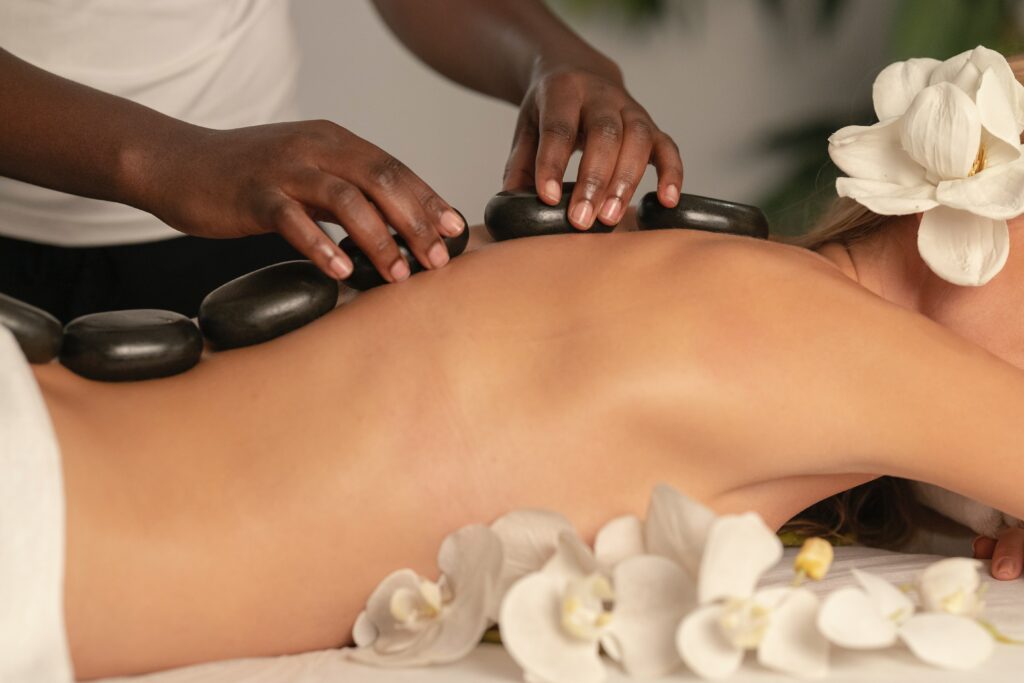
Skincare:
Lavender oil can help soothe skin irritation, improve acne, and reduce the appearance of scars and wrinkles as well as heal skin rashes.
Antimicrobial properties:
Lavender oil has antimicrobial properties that may help fight against bacteria and fungi. A great way to use lavender essential oil is to blend it with your body scrub. Adding lavender to the scrub not only gives it a beautiful floral fragrance but also makes it feel luxurious.
Anti-Aging Benefits
Lavender oil has anti-aging benefits because it is rich in antioxidants. These antioxidants help to protect the skin from damage caused by free radicals. Free radicals are unstable molecules that can damage cells and cause premature aging. Lavender oil also has anti-inflammatory properties, which can help to reduce the appearance of wrinkles.

The Top Five Oils for Skin
There are a number of essential oils that can be beneficial for the skin such as lemongrass oil, eucalyptus oil, bergamot oil, rosemary oil, neroli oil, jojoba oil, antibacterial oil, argan oil, rose oil, peppermint oil, citrus oils, olive oil, sweet almond oil, carrot seed oil, and other essential oils.
But the top five best essential oils for skin health that are used more often are lavender (which is our focus today), tea tree, rosehip, chamomile, and coconut oil. Each of these oils has unique properties that can help to improve the health and appearance of the skin.
Tea Tree Oil
If you have oily skin Tea Tree essential oil is for you. Tea Tree oil is an essential oil that has a wide range of benefits. It can be used to treat skin conditions and infections, and even boost your immune system. This essential oil has antimicrobial and anti-inflammatory properties, making it an effective treatment for acne, eczema, and other skin conditions. This essential oil can also be used to treat respiratory infections and boost your immune system. It can also help to soothe burns and speed up the healing process.
To use tea tree essential oil for sun exposure, simply apply a few drops to the affected area and massage it in. You can also add a few drops to your regular sunscreen for an extra boost of protection and to prevent dry skin.
When used topically, tea tree essential oil is believed to have anti-fungal properties. Tea tree oil is also commonly used to treat insect bites.
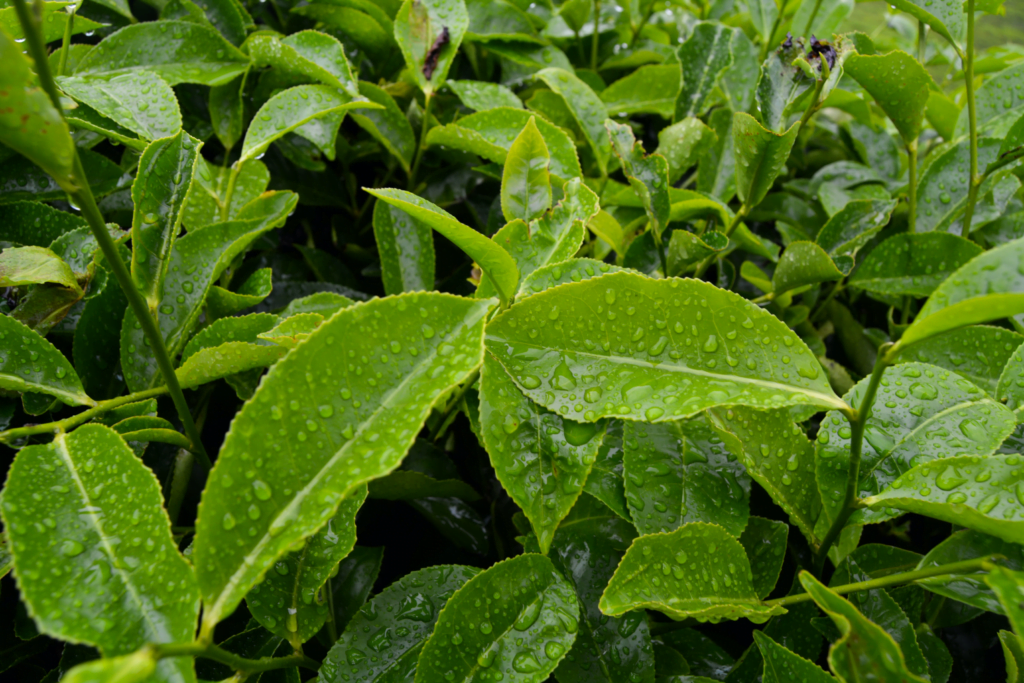
Rosehip oil
Rosehip oil has been used for centuries in traditional Chinese medicine, and recent studies have shown that it has a number of benefits for the skin. Rosehip oil is high in antioxidants, which can help to protect the skin from damage caused by free radicals. It is also a natural anti-inflammatory, so it can help to reduce redness and swelling and it has wound-healing properties. This essential oil blend is also a great choice for sensitive skin. Rosehip oil is a great choice for mature skin, thanks to its anti-aging effects. The oil is vitamin-rich, especially vitamin A, which can help improve the appearance of wrinkles and fine lines.
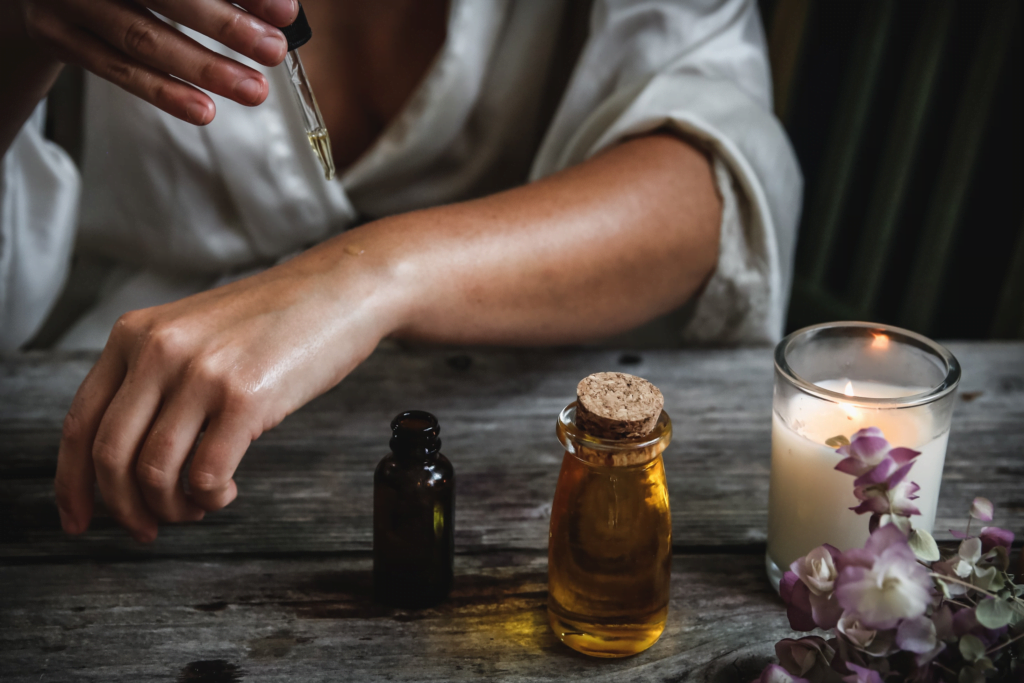
In addition, this essential oil is an excellent moisturizer, so it can help to keep the skin hydrated and healthy. Rosehip oil is high in essential fatty acids and antioxidants, which makes it an effective natural treatment for skin inflammation.
The oil can help to soothe and calm irritated skin and reduce the appearance of redness and swelling. When applied topically, rosehip oil can also help to heal wounds and scars and leave you with glowing skin.
Chamomile oil
This oil is a natural anti-inflammatory essential oil and works for all skin types. Chamomile oil is extracted from the chamomile plant and has been used for centuries to treat a variety of ailments. Chamomile oil is a natural antihistamine and can help to relieve itching and swelling.
Chamomile oil can also be used to treat eczema and psoriasis. Chamomile oil is gentle and can be used on sensitive skin. Chamomile oil is one of the best natural remedies for acne-prone skin and skin rashes. This oil has anti-inflammatory and antibacterial properties that help to soothe and heal the skin. Chamomile oil also helps to balance the natural skin oils, keeping the skin hydrated and preventing further breakouts.
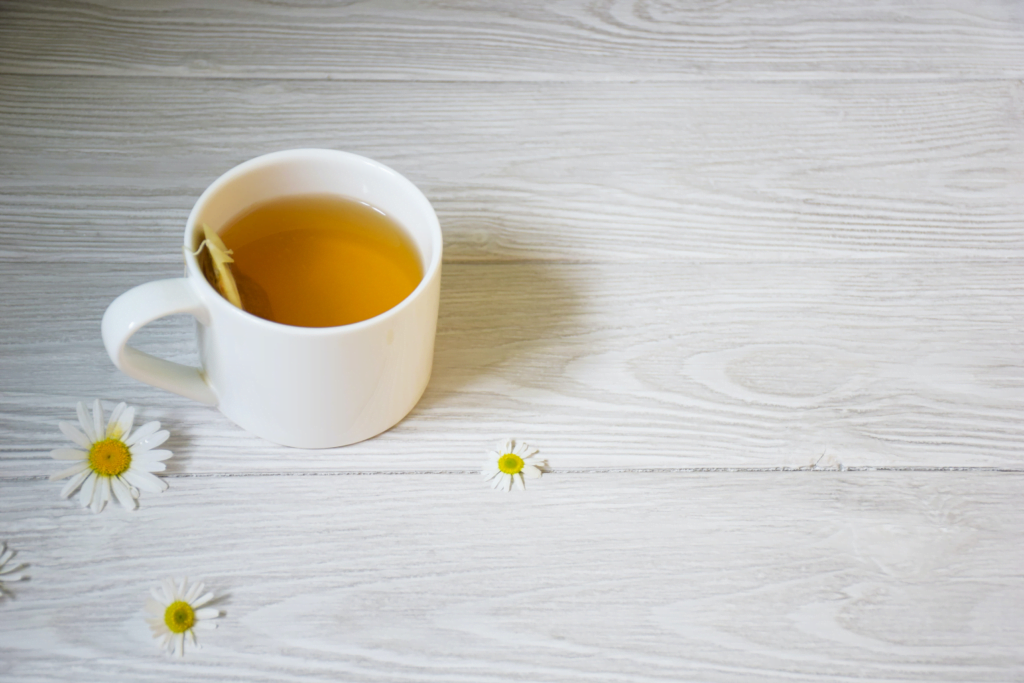
Coconut oil
Coconut oil’s benefits are many and varied. For one, it is an excellent source of healthy fats. Coconut oil is also known for its anti-inflammatory properties, which can help to reduce the risk of certain diseases.
Additionally, coconut oil is compatible with all skin types and can help to improve your skin and hair health. Coconut oil is also an effective moisturizer, helping to keep your skin hydrated and looking its best.
Coconut oil can help to cleanse and nourish your skin by binding with excess sebum and dirt, drawing out impurities from your pores. Coconut oil is rich in vitamin E, omega-3 fatty acids, and lauric acid, which are all beneficial for your skin. When used regularly, coconut oil can help to give you radiant, healthy-looking skin.
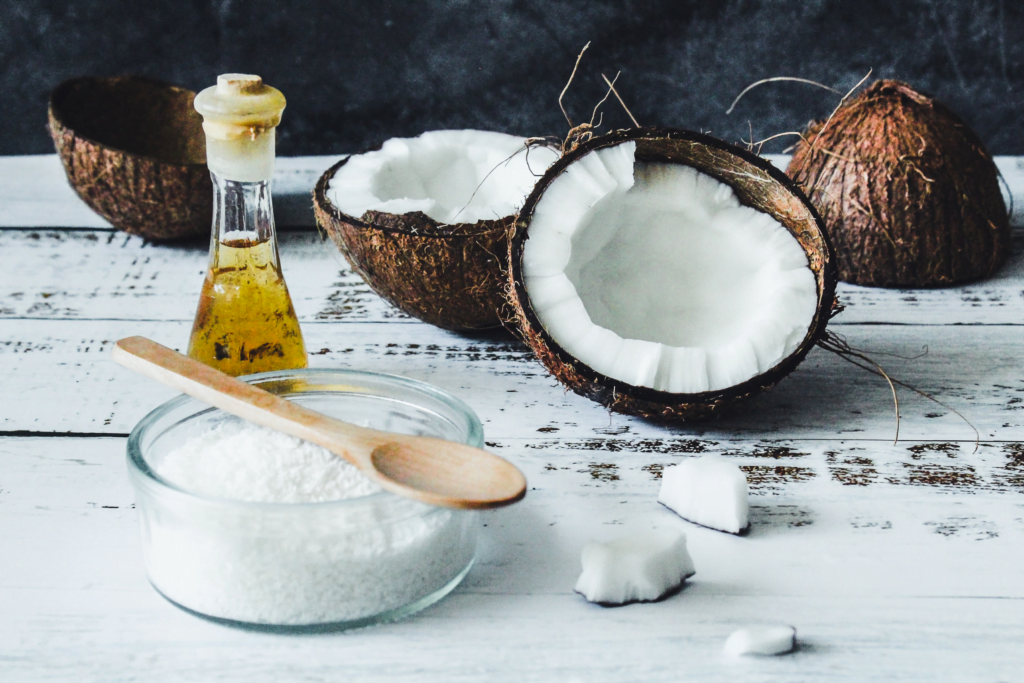
When used in combination, these five essential oils can provide a comprehensive approach to skincare. Adding essential oils to your skincare improves the health of the skin and leaves it looking radiant and beautiful.
Benefits Comparison
Lavender oil is well known for its calming and relaxing properties, making it a popular choice for use in aromatherapy. When compared to other popular oils such as tea tree oil, rosehip oil, chamomile oil, and coconut oil, lavender oil stands out for its ability to soothe and calm the mind and body. Lavender oil is also effective in treating skin conditions such as acne and eczema and can be used to promote healthy hair growth.
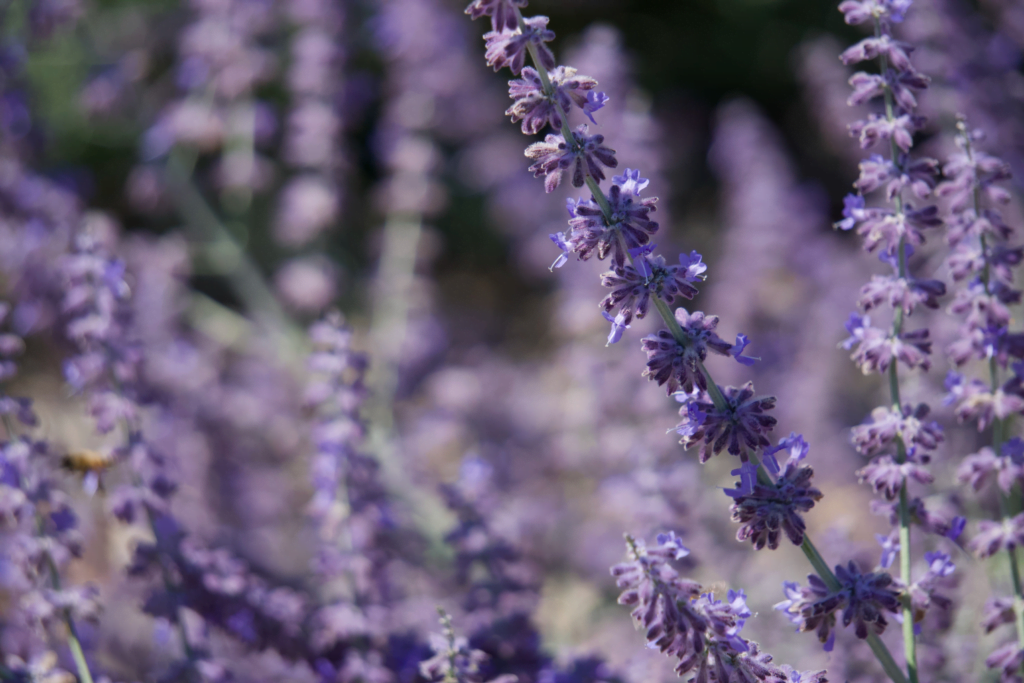
Lavender oil and coconut oil are two popular natural oils that offer a variety of benefits. Both oils can be used for skincare, hair care, and aromatherapy. Lavender oil is known for its relaxing and calming properties, making it a great choice for use in aromatherapy. It can also help to soothe dry skin and reduce inflammation. Coconut oil is rich in antioxidants and fatty acids, making it an excellent choice for use in skin and hair care. It can help to nourish and hydrate the skin, and can also help to reduce frizz and add shine to hair.
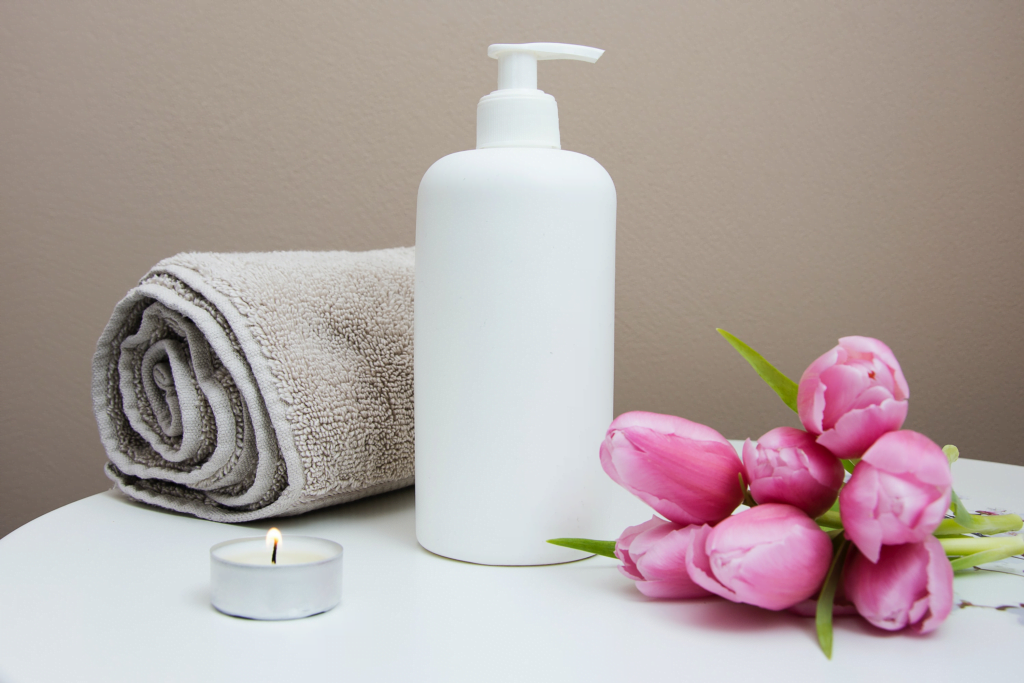
There are a few reasons why rosehip oil is better for skin repair than lavender oil. First, rosehip oil is packed with nutrients like vitamin C and essential fatty acids, which are essential for skin health.
Rosehip oil is a natural anti-inflammatory, so it can help to soothe and calm dermatitis. Finally, rosehip oil is known for its ability to help skin regenerate and heal, making it an ideal choice for those with damaged or aging skin. Both oils have a wide range of benefits, making them popular choices for natural health and beauty.

Essential Oils for Skin Care
There are many ways to use essential oils in skincare. Some people add them to their moisturizer or face cream, while others use them in a toner or facial serum. Essential oils can also be used in a facial massage or added to a bath or foot soak.
Essential oils are known for their healing properties and can help to soothe dry or irritated skin. They can also help to reduce wrinkles and fine lines and improve overall skin tone and texture.
When using essential oils in skin care, it is important to start with a small amount and increase as needed. It is also important to choose a quality oil that is suitable for your skin type and dilute it before applying it to the skin.
How To Choose The Right Essential Oils For Your Skin Type?
There are a few things to consider when choosing the right essential oil for your skin type. If you have oily skin, you’ll want to choose an oil that will help to regulate sebum production and keep your skin feeling balanced.
Dry Skin
If you have dry skin you’ll want an oil that is hydrating and will help to replenish your skin’s natural moisture levels. Chamomile oil is a good choice for dry skin.
Sensitive Skin
For sensitive skin, you’ll want to choose an oil that is calming and won’t irritate your skin. Use sandalwood oil.
Normal Skin
For normal skin, you’ll want an oil that will help to maintain your skin’s healthy appearance such as lavender oil.
Oily Skin
If you’re looking for an essential oil that can help with oily skin, try one that contains stimulating and analgesic properties. These oils often contain key ingredients like esters, which can help keep excess sebum under control. Use Frankincense essential oil for oily skin.

The best way to figure out which oil is right for you is to experiment and see what works best for your skin. Start with a small amount of oil and apply it to your skin. If you notice any irritation or redness, discontinue use. Otherwise, continue using the oil and see how your skin cells respond.
Another way to figure out which essential oils to implement in your skincare is to research the different skin issues and which essential oil heals them. Some causes for essential oils usage could be inflamed skin, itchy skin, skin discoloration, dehydrated skin, allergic reactions, weird skin texture, acne scars, stretch marks, mature skin, and others.
Carrier Oils
Carrier oils are oils that are used to dilute essential oils and absolutes before they are applied to the skin. They help to ‘carry’ the essential oil or absolute onto the skin, and also help to spread it out evenly. carrier oils are typically cold-pressed from the seeds, nuts, or fruits of plants, and do not contain any synthetic ingredients.
Some examples of carrier oil are jojoba oil, sweet almond oil, grapeseed oil, argan oil, and avocado oil. carrier oils can be used alone or in combination with each other, depending on the desired effect.
When selecting a carrier oil, it is important to consider its properties and how they will work with the essential oil or absolute that you are using. For example, if you are using an essential oil that is very potent, you may want to choose a carrier oil that is lighter in order to reduce the risk of skin irritation. Conversely, if you are using an essential oil that is very gentle, you may want to choose a carrier oil that is more nourishing to the skin.
Dilution Guidelines
Carrier oils help to carry the essential oil into the skin and can also help to reduce skin irritation.

Start with a low dilution ratio of 1-2% and increase as needed. Third, always test the diluted essential oil on a small area of skin before applying it to a larger area. Finally, be sure to store diluted oils in a dark, cool place.
Also, keep in mind that not all essential oils are necessarily good for your skin. Certain essential oils may cause skin concerns
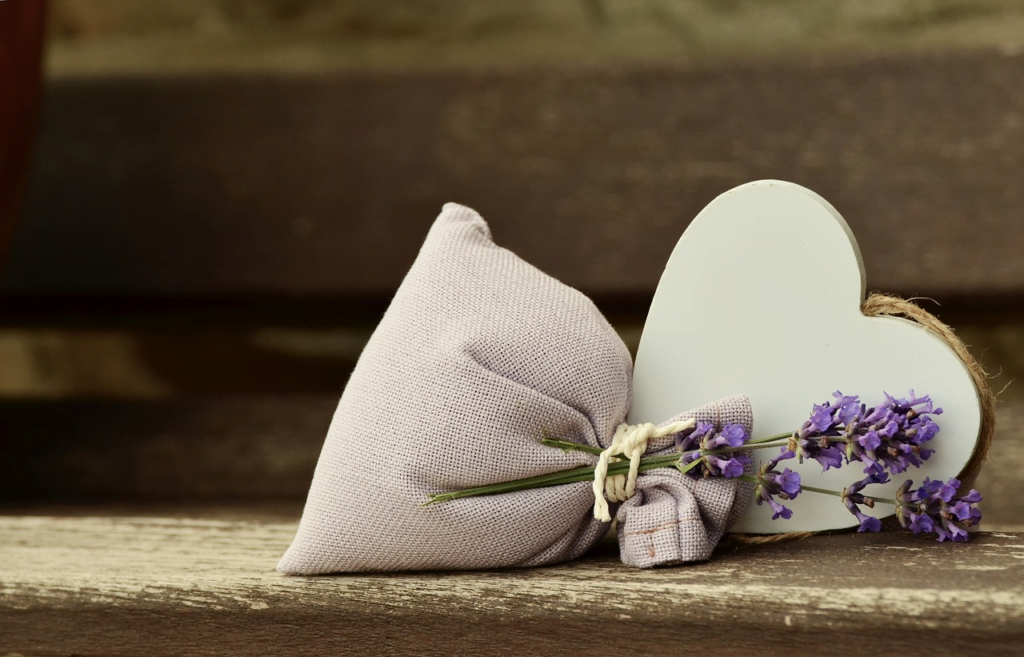
In conclusion, the top five essential oils, including coconut oil, rosehip oil, chamomile oil, lavender oil, and tea tree oil, all offer a unique set of benefits and can be used for a variety of purposes.
Among these oils, lavender oil stands out for its versatility and widespread popularity. Its calming and soothing properties make it a popular choice for use in skincare and aromatherapy, and its versatility allows it to be used for a wide range of issues, from reducing anxiety to treating minor skin irritations.
Whether you’re looking to improve your skin, manage stress, or simply enjoy the benefits of aromatherapy, the lavender essential oil is a must-have in your collection.
When using essential oil don’t forget to patch test the oil on a small area of skin before using it more extensively. Doing a patch test ensures that the oil does not cause any adverse reactions to your skin.
Additionally, always use high-quality, pure essential oils and follow the recommended usage guidelines on the product label. And it’s a good idea to consult with a healthcare professional, especially if you have any pre-existing skin conditions or concerns.
By following these recommendations, you can safely and effectively incorporate essential oils into your skincare routine and enjoy their many benefits.



